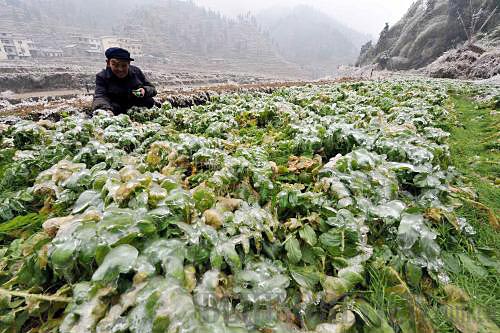|
 |
|
COLD WEATHER WOES: A farmer in Guilin City, Guangxi Zhuang Autonomous Region, checks his ice-coated cabbage in the field on January 8. More than 2 million people in Guangxi had suffered from damage inflicted by low temperatures (CHEN RUIHUA) |
Copyright Crackdown
Vendors of illegally copied films, music or other copyright products online will face up to three years in jail, the Ministry of Public Security announced on January 11 in a pledge to crack down on "rampant" piracy.
The ministry said the police had arrested more than 4,000 people suspected of intellectual property rights violations since a crackdown began last November. The campaign will continue until March.
Gao Feng, Deputy Director of the ministry's Economic Crime Investigation Department, said more than 2,000 cases of piracy, involving more than 2.3 billion yuan ($348 million), had been dealt with during the crackdown.
"The astonishing results, on the one hand, reflect the achievements of the police during the campaign, but they also underline the fact that IPR infringements are still rampant," said Gao.
Innovation Encouraged
China's spending on developing nanotechnology over the past five years was more than three times than between 2001 and 2005, a national nanotechnology coordination committee said on January 11 in Beijing.
China invested more than 5 billion yuan ($758 million) on research and development of nanotechnology between 2006 and 2010, compared to 1.5 billion yuan ($227 million) in the previous five-year period, according to the committee.
With the funding, three nanotechnology research centers at the national level were established, including the National Center for Nanoscience and Technology.
Moreover, the number of patent applications concerning nanotechnology in China became the second largest in the world by 2009. Nanotechnology patent numbers increased from 4,600 in 2005 to 12,000 in 2009, said the committee.
Lead Poisoning Probe
An environmental protection official in an eastern county has been suspended for improper supervision and poor law enforcement after an investigation showed that a battery manufacturing plant located alongside a densely-populated community was responsible for lead poisoning that sickened over 200 children.
Twenty-eight victims were hospitalized, local authorities said on January 8.
Zhao Yiping, Director of the Environmental Protection Bureau of Huaining County, Anhui Province, which administers Gaohe Town where the children were poisoned, has been removed from his post after tests conducted on January 5 and 6 confirmed that excessive lead emissions from Borui Battery Co. Ltd. had polluted the nearby soil, said a spokesman of the provincial government.
Borui Battery failed the necessary environmental checks and was asked to close in August 2010, pending the improvement of its environmental protection facilities. However the company later resumed production without notifying the government, said the spokesman.
Fighter Test
A Chinese military official said on January 11 that China's military hardware development is not aimed at any other country.
Guan Youfei, Deputy Director of Foreign Affairs Office of the Ministry of National Defense, made the remarks while responding to a question on the reported test flight of China's self-developed J-20 stealth fighter jet.
"The development of China's military hardware is not aimed at any other country or any specific target and the timing was a matter of routine working arrangements," said Guan.
Weaponry was developed to safeguard China's national sovereignty, territorial integrity, and to adapt to the world's military changes, as well as the constant development of new weapons, he said.
Guan denied the test flight was timed deliberately to coincide with U.S. Defense Secretary Robert Gates' China visit on January 9-12.
China will always take the path of peaceful development, and adhere to the national defense policy, which is defensive in nature, he said. | 